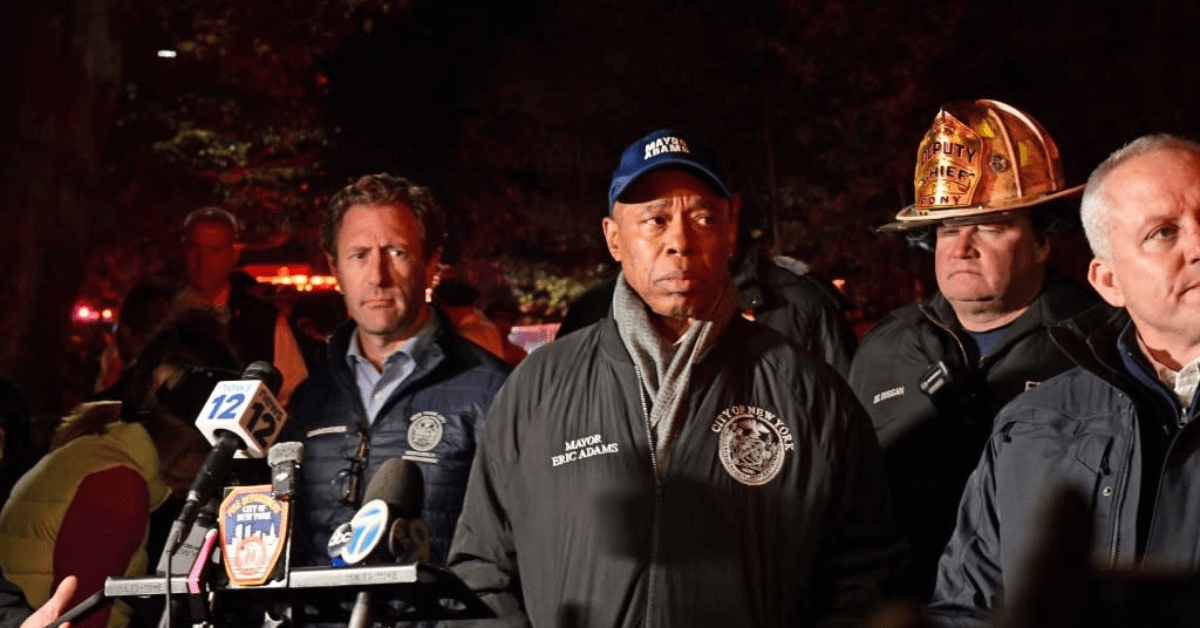New York City residents woke up Saturday to an unusual sight: a haze of smoke hanging over the skyline and an acrid smell in the air. Smoke from multiple wildfires in nearby New Jersey and even a brush fire in Brooklyn’s Prospect Park drifted over the city, casting a murky veil over the region.
As smoke levels rose, health officials issued warnings to residents, particularly those in sensitive groups, to stay indoors where possible. The fires, fueled by dry conditions, gusty winds, and an unseasonably warm November, have sparked a wave of concern across the metro area.
Uncontained Fires and Air Quality Alerts
The New Jersey Forest Fire Service is currently fighting at least five active wildfires. Among them, the “Cannonball 3 Wildfire” in Pompton Lakes, Passaic County, has burned through 100 acres and remains completely uncontained. As of Saturday, firefighters struggled to manage this fire amid gusty winds that made conditions dangerous and unpredictable.
Meanwhile, in Brooklyn, a brush fire ignited in Prospect Park on Friday evening. Nearly 100 firefighters responded to the two-acre blaze, located in the densely wooded Nethermead area near the dog beach. Firefighters worked through the night to extinguish the flames, with drones deployed to locate hot spots. No injuries were reported, but the fire’s cause remains unknown.
These wildfires and strong winds have affected air quality across the region. Parts of Bergen, Passaic, and Essex counties in New Jersey experienced “Level Red” air quality on Saturday, indicating AQI levels above 151—considered “unhealthy” for all groups. The New York State Department of Environmental Conservation also issued an alert for New York City and the counties of Westchester and Rockland, warning that air quality could reach “Level Orange” with AQI between 101-150, which poses risks for vulnerable groups.
Health Advisory in Effect
Health experts are urging residents to take precautions, especially those in high-risk categories, which include older adults, children, pregnant individuals, outdoor workers, and people with respiratory or heart conditions. Sensitive groups are advised to stay indoors and avoid outdoor exercise as the smoky air can lead to breathing problems and other health issues.
With unusually dry conditions in recent weeks—October was the driest on record for New York City—fire risks have increased across the area. On Friday, Mayor Eric Adams highlighted this concern, noting that NYC is now under a drought watch. The drought, combined with recent high temperatures and gusty winds, has contributed to the fires spreading more quickly and made containment efforts even more challenging.
Looking Ahead: Rain Could Bring Relief
Forecasts show a chance of rain on Sunday, which could help firefighters and improve air quality across the region. However, meteorologists warn that rainfall amounts may be minimal, with a more significant chance of precipitation later in the week on Thursday. In the meantime, state and local fire crews remain vigilant, with teams monitoring the fires and the New Jersey Forest Fire Service deploying helicopters to drop water on active fire sites.
A Smoky, Hazy Week for NYC
This week has been one of the smokiest on record for New York City. On Staten Island, brush fires scorched parts of Clove Lakes Park and Brookfield Park in Great Kills. In the Bronx, a fire broke out in Van Cortlandt Park near the Major Deegan Expressway. Gusty winds of up to 30 mph on Saturday led the National Weather Service to issue a Red Flag Warning for NYC, Long Island, and the Lower Hudson Valley, meaning that any new fires could spread rapidly.
For now, residents of New York and New Jersey are bracing for a weekend of hazy skies and taking steps to stay safe as fires continue to burn and air quality remains compromised. Health officials remind everyone to stay informed of air quality levels and avoid outdoor activities where possible until the smoke clears.
As the situation develops, follow local weather and air quality updates, and take precautions to protect yourself and your family during this time of poor air quality.
